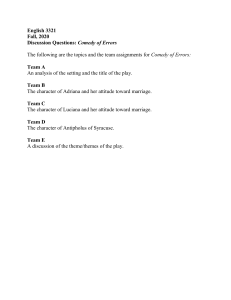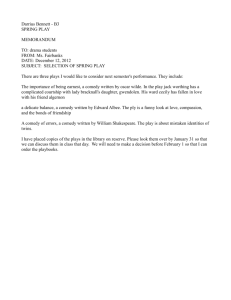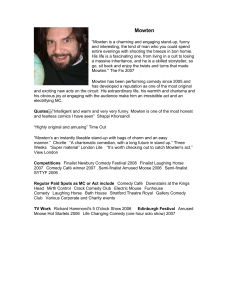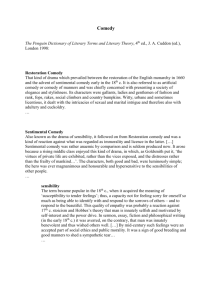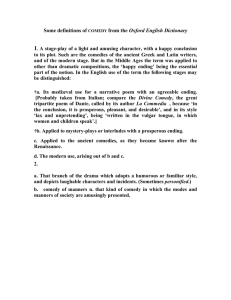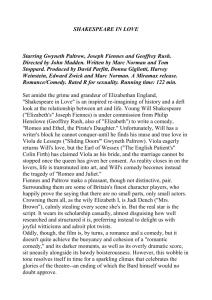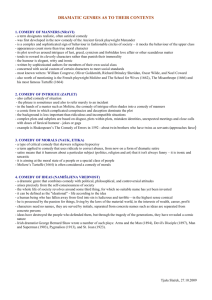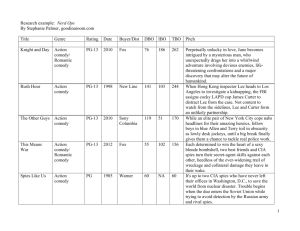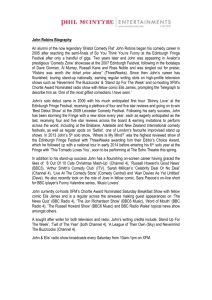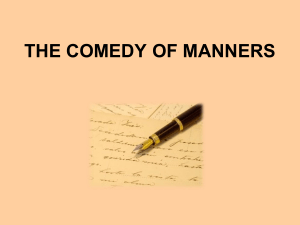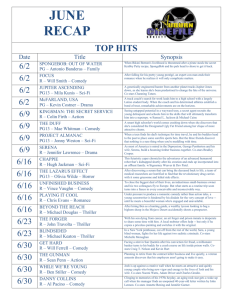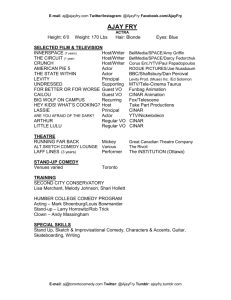Comedy in Literature
advertisement
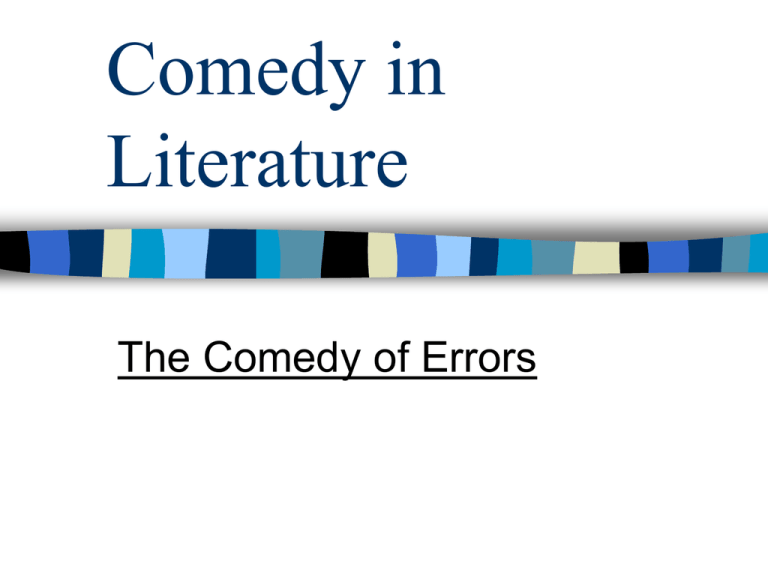
Comedy in Literature The Comedy of Errors Origins of Ancient greek myth of Zeus and princess Comedy Semele - affair: produced Dionysus who was premature, sown into Zeus who bore him later God of common man, fertility, wild things, impulses, wine Festivals held in ancient Greece to honor him Drama originates from these festivals Origins Cont. Greeks were masters of tragedy and comedy 3 types of comedy: Old, Middle and New Old= 5th century B.C. and are like tragedies in form (4 actors and a chorus) – Focus on ridicule – Political and social satires Mid= fall of Athens sparked change: 400323 B.C. – Mock re-enactments of famous myths – Comedy of manners – Not much survives New Comedy- Modern Comedy illustrate the decline of the chorus and political issues of Old Comedy is less obscene focuses on family matters with complications in love relationships introduces theme of love into literature of interest in the interactions between observable social types. New Modern Cont. The Middle Ages (500-1500)= dormant period in the development of the Comedy genre The Renaissance(re-birth)= based on 2 key principals – revival of classical forms developed by the ancient Greeks – a concern with secular life and an interest in humanism and the individual Characteristics of Comedy the presence of lovers the defeat of an imposter figure and subsequent assimilation into restored social fabric Celebrates a man’s ability to endure Exposes what Aristotle terms, “ludicrous” actions A comedy of errors: Definition Often a play Tone is light, satirical and farcical Involves cases of mistaken ID Usually has a positive resolution for everyone The Comedy of Errors Written 1592-1594 One of Shakespeare’s shortest plays Observes the “three unities” -unity of time (24 hrs) -unity of place (one geo. location) -unity of action (one main plot) Themes Appearance versus reality (trust in self and situation) – Ex.: Act II, sc. i: Antipholus of Syracuse: “What error drives our eyes and ears amiss?/Until I know this sure uncertainty,/I’ll entertain the offer’d fallacy.” – Act. III, sc. I: Anti. Of Ephesus trying to enter his home after “already there” Love and marriage – Adriana and husband: • she calls him to dinner and when he “refuses”, she attempts to lock him out • Upset at possible infidelity – Luciana and her ideas about marriage – (Act II, sc. i): • Luciana believes that “men, more divine” are “the masters of all these”; Adriana is upset at her husbands “actions” – Dromio of Syracuse and greasy cook (Act III, sc. ii) Themes Cont. Madness – Each person questions their sanity – Precursor to King Lear and Hamlet – Act II, sc. ii: • Anti of S. states: – “ What error drives our eyes and ears amiss?/ Until I know this sure certainty,/ I’ll entertain the offer’d fallacy.” – He chooses to play along • Dromio of S. response: – “This is the fairy land: O spite of spites!/ We talk goblins, owls and sprites: / If we obey them, this will ensue,/ They’ll suck our breath or pinch us black and blue.” Motifs Definition: vehicle for expressing the theme Time • Luciana reprimands Adriana for not having patience • Act II, sc. i: time is bald---read • Had the characters simply had patience and communicated, the “errors” might have been discovered Violence – Act I, Sc. I: Antipholus of S. beats Dromio of E.– accuses him of stealing 1000 marks and talking nonsense about a “wife” and “dinner” – Act II, Sc. ii: Anti. of S. beats Dromio of S. for “…flouting [him]; and then, wherefore, /For urging it the second time to [him]” • Flouting= showing contempt or scorn; mocking insult Irony 3 Types – Dramatic irony: occurs when the reader or the audience understands more about the events than a character – Situational irony: occurs when what actually happens is the opposite of what is expected – Verbal irony: a character says one thing but means another
